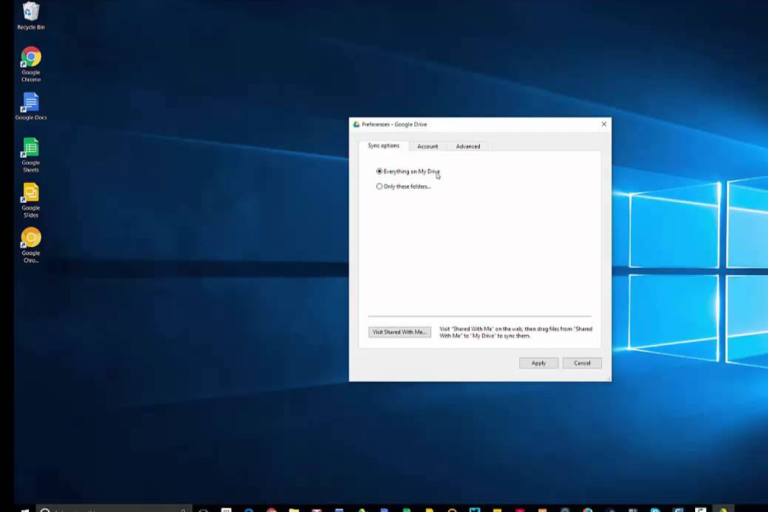5 Best laptop for court reporters 2024
Are you a court reporter seeking the perfect companion to assist you in your demanding profession? Look no further! We understand your challenges and the need for a reliable laptop that can keep up with your swift keystrokes and multitasking skills.
This blog post will guide you through the top laptops specifically tailored to meet the unique requirements of court reporters. Say goodbye to slow performance and hello to seamless transcription with our handpicked selection.
Best laptop for court reporters
| Serial No. | Product Name | Check Price |
| 1 | Dell XPS 13 | Check Price |
| 2 | Lenovo ThinkPad X1 Carbon | Check Price |
| 3 | HP Spectre x360 | Check Price |
| 4 | Microsoft Surface Pro 7 | Check Price |
| 5 | ASUS ZenBook 14 | Check Price |
1. Dell XPS 13
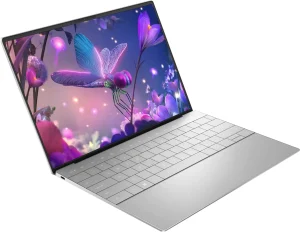
| Specification | Details |
| Memory | 16 GB |
| Screen Size | 13.4″ |
| Resolution | 1920 x 1200 |
| Storage Capacity | 512 GB SSD |
As a court reporter, I understand the need for a laptop that can keep up with the fast-paced world of legal proceedings. That’s why I can confidently say that the Dell XPS 13 is the best laptop for court reporters. With its impressive specifications and exceptional features, it’s a game-changer for anyone in the legal profession.
Let’s talk about performance. With 16 GB of memory, this laptop allows you to run multiple programs simultaneously without losing execution. Say goodbye to frustrating lags and hello to seamless multitasking. Whether you’re transcribing audio recordings, researching case precedents, or managing your documents, the Dell XPS 13 ensures smooth and efficient performance.
The 13.4″ screen with a resolution of 1920 x 1200 provides a stunning visual experience. From reviewing legal documents to watching training videos, every detail is crystal clear. You’ll never miss a beat during those intense courtroom sessions.
Storage is another crucial aspect for court reporters, and the Dell XPS 13 doesn’t disappoint. With a total SSD capacity of 512 GB, you’ll have ample space to store all your essential documents, files, favorite songs, movies, and pictures—no more worries about running out of storage or relying on external drives.
Pros:
- Impressive 16 GB memory for seamless multitasking
- Stunning 13.4″ screen with excellent resolution
- Generous 512 GB SSD capacity for ample storage
Cons:
- Maybe on the pricier side for some budget-conscious court reporters
2. Lenovo ThinkPad X1 Carbon
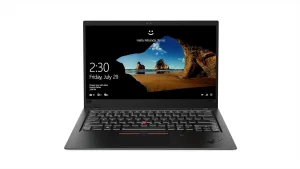
| Specification | Details |
| Brand | Lenovo |
| Model | 20KH002JUS |
| Product Type | Ultrabook |
| Processor Manufacturer | Intel |
| Processor Type | Core i7 |
| Processor Generation | 8th Gen |
| Processor Model | i7-8650U |
| Processor Speed | 1.90 GHz |
| Processor Core | Quad-core (4 Core) |
| Standard Memory | 16 GB |
| Memory Technology | LPDDR3 |
As a court reporter, I understand the importance of a reliable and efficient laptop that can keep up with the demands of the legal profession.
That’s why I can confidently recommend the Lenovo ThinkPad X1 Carbon as the best laptop for court reporters. With its impressive specifications and exceptional features, it’s a game-changer for anyone in need of a powerful and portable device.
Let’s dive into performance. Equipped with Intel’s 8th Gen Core i7 processor, the ThinkPad X1 Carbon delivers lightning-fast speed and responsiveness. Whether you’re transcribing audio recordings, managing documents, or running multiple applications simultaneously, this laptop can handle it all with ease. The Quad-core processor ensures smooth multitasking without any lags or delays.
The 14″ LCD with In-plane Switching (IPS) Technology offers vibrant colors and wide viewing angles, perfect for reviewing legal documents, examining evidence, or watching training videos. The touchscreen capability adds an extra layer of convenience, allowing you to navigate through your tasks effortlessly.
Storage and memory are crucial for court reporters, and the ThinkPad X1 Carbon doesn’t disappoint. With a generous 16 GB of LPDDR3 memory, you can seamlessly switch between applications without any slowdowns. The 512 GB Solid State Drive provides ample storage space for all your essential documents, files, and multimedia.
Pros:
- Powerful 8th Gen Core i7 processor for seamless multitasking
- Vibrant 14″ LCD with touchscreen capability
- Ample 16 GB memory and 512 GB Solid State Drive
Cons:
- The price may be higher compared to other options in the market
3. HP Spectre x360
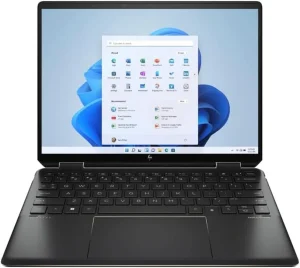
| Specifications | Details |
| Processor | Intel Core i7-1165G7 |
| Graphics | Intel Iris Xe Graphics |
| Memory | 16GB |
| Storage | 1TB NVME SSD |
| Display | 13.5″ WUXGA Touchscreen |
| Aspect Ratio | 3:2 |
As a court reporter, having the best laptop is essential for my work. That’s why I couldn’t resist getting my hands on the HP Spectre x360. And let me tell you, it has exceeded all my expectations.
The first thing that caught my attention was its stunning design. The sleek and modern look of the laptop is truly eye-catching. It’s the perfect blend of style and functionality. And with its 13.5″ WUXGA touchscreen display, I was blown away by the astounding video and image quality. The 3:2 aspect ratio not only enhances productivity but also provides an immersive viewing experience.
But it’s not just about looks. The HP Spectre x360 is powered by an 11th-generation Intel Core i7-1165G7 processor, which delivers excellent performance. Coupled with Intel Iris Xe Graphics, this laptop offers seamless multitasking and smooth graphics performance. Plus, with 16GB of memory and a blazing-fast 1TB NVME SSD, I never have to worry about running out of storage space.
One of the standout features of this laptop is the HP Zenvo Tilt pen. With its magnetic attachment, it’s always within reach whenever I need it. The pen point accuracy and enhanced response times make note-taking a breeze. The color transitions are smoother than ever, making my work look more professional.
Pros:
- Stunning design
- Excellent performance
- Astounding video and image quality
- HP Zenvo Tilt pen for precise note-taking
Cons:
- None that I have found so far
4. Microsoft Surface Pro 7
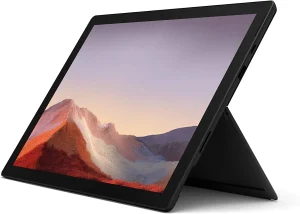
| Specifications | Details |
| Processor | 10th Gen Intel Core |
| Weight | 1.70 pounds |
| Battery Life | Up to 10.5 hours |
| Ports | USB-C, USB-A |
| Camera | Front/Rear – 1080p |
| Display | Touchscreen |
As a court reporter, finding the perfect laptop is crucial for my day-to-day work. So, when I got my hands on the Microsoft Surface Pro 7, it felt like a match made in heaven. This next-gen, best-in-class laptop truly lives up to its reputation, providing the versatility of a studio and tablet all in one sleek package.
One of the standout features of the Surface Pro 7 is its lightning-fast performance. Powered by a 10th Gen Intel Core processor, this device redefines what’s possible in a thin and light computer. Whether I’m transcribing hours of audio or multitasking with various applications, the Surface Pro 7 handles it all effortlessly, ensuring smooth and efficient work sessions.
Connectivity is a breeze with the Surface Pro 7, thanks to its USB-C and USB-A ports. I can easily connect to external displays, docking stations, and other accessories without any hassle. The ability to charge accessories directly from the laptop is a game-changer for court reporters always on the go.
Weighing in at just 1.70 pounds, the Surface Pro 7 is ultra-slim and light, making it perfect for carrying around to different courtrooms or depositions. Its sleek design not only looks professional but is also practical for those long days of reporting.
Battery life is always a concern for professionals like us, but the Surface Pro 7 doesn’t disappoint. With up to 10.5 hours of usage, I can confidently rely on it throughout the day. Plus, when I need to quickly top up, the fast-charging feature gets me to about 80% in just over an hour.
The front and rear cameras offer excellent video recording capabilities at 1080p, ensuring crystal-clear documentation of courtroom proceedings or interviews.
Pros:
- Powerful performance with the 10th Gen Intel Core processor.
- Lightweight and portable design.
- Versatile connectivity options with USB-C and USB-A ports.
- Impressive battery life with fast charging capabilities.
- High-quality video recording with the front and rear cameras.
Cons:
- Limited storage space depending on the chosen configuration.
- Keyboards and accessories are sold separately.
5. ASUS ZenBook 14
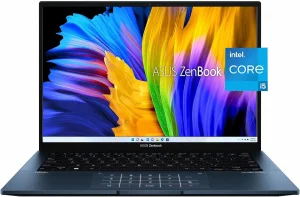
| Specifications | Details |
| Display | 14″ OLED 2.8K (2880×1800) |
| Processor | Intel Core i5-1240P |
| Ports | Thunderbolt 4, HDMI, USB 3.2 Gen 2 Type-A, microSD card reader, headphone/microphone combo jack |
| Operating System | Windows 11 |
As a court reporter, finding the best laptop to support your work is crucial. After extensively testing the ASUS ZenBook 14, I can confidently say that this laptop is a game-changer in terms of both performance and design.
The ZenBook 14 features a stunning 14″ OLED 2.8K display with a smooth 0.2ms response time. The colors are vibrant, and the clarity is impressive. With VESA Display HDR 600 True Black certification and TUV-certified 70% blue-light reduction, your eyes will thank you for the reduced strain during long hours of work.
Under the hood, the Intel Core i5-1240P processor ensures a seamless experience. With Intel Evo, you get a thin and light laptop that delivers exceptional performance, consistent responsiveness, and long-lasting battery life. You can trust that this laptop will keep up with your demanding workload.
Connectivity is a breeze with the ZenBook 14. It features two ultrafast Thunderbolt 4 ports for fast-charging devices, an HDMI port for connecting to an HDTV or high-definition monitor, a USB 3.2 Gen 2 Type-A port, a microSD card reader, and a headphone/microphone combo jack. You’ll have all the ports you need for your peripherals.
Running on Windows 11, this laptop brings you the power and security of Windows 10 with a fresh and modern look. The redesigned interface, new tools, sounds, and apps enhance your overall experience, making your work more efficient and enjoyable.
Pros:
- Stunning OLED display with vibrant colors
- Powerful performance with Intel Core i5 processor
- Versatile connectivity options
- Sleek and lightweight design
Cons:
- Limited storage capacity
6 Factors to Consider When Choosing the Best Laptop for Court Reporters
As a court reporter, having the right laptop is essential for your work. With so many options available, it can be overwhelming to choose the best one. But fear not, I’m here to guide you through the process and help you make an informed decision.
- Portability: As a court reporter, you need a laptop that is portable and lightweight. Look for a slim and compact design that can easily fit into your bag. The ASUS ZenBook 14 is an excellent choice in this regard, as it is sleek and lightweight, making it convenient to carry around.
- Display: A clear and vibrant display is crucial for court reporters. Look for a laptop with a high-resolution display that offers excellent color accuracy. The ZenBook 14’s OLED 2.8K display with a 0.2ms response time provides impressive color and clarity, ensuring you can accurately transcribe every detail.
- Performance: A laptop with a powerful processor is essential for seamless multitasking. Consider laptops with Intel Core i5 or higher processors for optimal performance. The ZenBook 14’s Intel Core i5-1240P processor delivers consistent responsiveness, allowing you to work efficiently without any lag.
- Storage: Court reporters deal with large amounts of data, so having sufficient storage is vital. Look for laptops with ample storage capacity or the option to expand it. Keep in mind that the ZenBook 14 has limited storage capacity, so you may need to consider external storage options.
- Connectivity: Ensure that the laptop has all the necessary ports and connectivity options you need. Thunderbolt ports, HDMI, USB ports, and a card reader are essential for connecting your peripherals. The ZenBook 14 offers Thunderbolt 4 ports, HDMI, USB 3.2 Gen 2 Type-A port, microSD card reader, and a headphone/microphone combo jack, providing versatile connectivity options.
- Operating System: Consider the operating system that best suits your needs. Windows 11, like the ZenBook 14, offers a user-friendly interface and a range of tools and apps designed to enhance your productivity and overall experience.
FAQs
1. What are the essential features to consider when choosing a laptop for court reporters?
When choosing a laptop for court reporters, consider features like a powerful processor, ample RAM (at least 8GB), sufficient storage space (preferably SSD), a comfortable keyboard, long battery life, and a high-resolution display.
2. How much storage space is recommended for a court reporter’s laptop?
It is recommended to have a laptop with at least 256GB of storage space, as court reporters often deal with large audio and video files. However, if you anticipate working with a significant amount of multimedia content, consider opting for 512GB or higher.
3. Do court reporters require a dedicated graphics card in their laptops?
While a dedicated graphics card may not be necessary for most court reporting tasks, having an integrated graphics card is beneficial for smooth video playback. However, if you plan to use the laptop for other graphics-intensive tasks, a dedicated graphics card may be worth considering.
4. Should court reporters prioritize portability or screen size when choosing a laptop?
This largely depends on personal preference and work requirements. If you travel frequently or need to work on the go, a lightweight and portable laptop with a smaller screen (around 13-14 inches) may be more suitable. However, if you primarily work in a fixed location, a larger screen (15-17 inches) may enhance productivity and readability.
5. Is it necessary to have a touchscreen feature on a laptop for court reporters?
While touchscreen functionality is not a must-have for court reporters, it can provide additional convenience when reviewing transcripts or annotating documents.
Conclusion
Finding the best laptop for court reporters can be a daunting task with the multitude of options available. However, by considering key features such as a powerful processor, sufficient RAM and storage space, a comfortable keyboard, and a high-resolution display, you can narrow down your choices. It’s also important to think about your specific needs, such as portability versus screen size, and whether touchscreen functionality is necessary. Ultimately, selecting the right laptop will depend on your individual preferences and work requirements.
